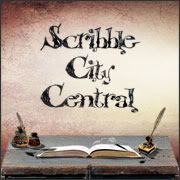Ty/Joe is a fantastic creation - angst, bolshiness, fear, tenderness and intelligence are mixed up together in one intriguing 14 year-old package. He is believable - and almost more important - likeable. As a reader I really cared about what happens to him and that is a rare thing to achieve for any writer. I liked the sequel, Almost True, equally as much, and was very happy indeed when I got my hands on an early copy of Another Life, the just-published third book, which, once again, kept me turning pages into the wee small hours, such was my eagerness to find out what happened next. It's a standout trilogy, and if you haven't read these books yet, I urge you not to wait a minute longer before doing so.
Keren has been kind enough to answer some of the
BURNING QUESTIONS
I had about the books, and I'd like to welcome her to the Scribble City Central author interview chair.
 |
| KEREN DAVID |
KD: I wanted the third book to do something a bit different, and I thought it would be good to see Ty from the outside and in a wider context. By contrasting Archie and Ty’s backgrounds I could write about middle class kids and the problems that can come from their privileges.
Julie Myerson’s books The Lost Child and Living with Teenagers were key texts for me, especially when creating the family of Oscar, Archie’s friend. Then there was a tragic story in the news about a party in West London which ended in the death of a teenage girl when she took drugs belonging to her host’s dad – the parents having gone out for the night to leave them to party in peace. These were all inspirations for Another Life.
Ty and Archie are very different, but they both share the same ability to do incredibly stupid things, and I’d like readers to think as much about their similarities as their differences.
SCC: A little information is a dangerous thing. Archie in particular has few facts to go on in his quest for the truth about Ty, an alarmingly insouciant naivety, and a tendency to step into situations without thinking them through. I’d be interested to know what your teenage readers make of him! As an adult reader (and parent of teenagers), I tend to feel sorry for him and want to shake him, mostly both at the same time! Did you find him easier or more difficult to write as a character than Ty, and why?
KD: Archie started off (in the second book, Almost True) as a plot device, to give Ty someone his own age to bounce off when he is staying with his grandparents. He was created to be spoiled and snobby and he annoyed me as much as he did Ty. But my daughter then aged 13, reading the book as I wrote it, thought he was very funny and kept on asking me to bring him back into the story. So I did, and Ty and I both learned to like him better. Ty is my favourite character to write, he’s my first fictional character, so really my default voice - in fact I used to worry that I could only write in Ty’s voice! Archie’s bounciness and recklessness came quite easily though – although he never lost his power to annoy me.
SCC: As an ex-journalist, you know the value of asking the right questions. It’s what getting the truth out of people is all about. One quote that struck me is this: “Maybe there’s no such thing as real truth, just lots and lots of different ways of explaining the same thing.” This seems to be a recurring theme in all three books. Did you set out to give your readers the feeling that there was always another piece of the jigsaw, another angle, so that ‘the truth’ was always shifting their perceptions of what was really happening in the story past and present?
KD: This is really the theme of the second book, Almost True which examines both meanings of true – the elasticity of ‘truth’ and also how far one can be loyal to a friend. I try and contrast the attempts to establish the truth by authorities – teachers, lawyers, policemen, journalists and (most slippery of all) politicians - against the multi-layered, subjective, unreliable process of telling the ‘whole’ story.
SCC: When I read a KD novel, I am always blown away by your sense of pace, by how you manipulate the story arcs so that the reader just has to turn another page to find out what happens next. Do you think that’s something which has been facilitated by your journalistic experience? Has being a journalist helped or hindered you as a YA writer?
KD: I think it all comes down to being someone who is very easily bored! That’s why I love journalism, especially news-editing, it’s very fast, very interesting, constantly changing.
As a reporter I’m used to telling stories in a succinct economical style, so I tend to throw in plot twists and turns to keep myself interested and also to fill up the space that other people use for descriptive passages and long discussions of people’s feelings. I’m also always thinking about my readers and what I want them to be thinking or feeling at that point – as I have such a low boredom threshold, I tend to assume readers will too.
SCC: Every writer has a different process. Mine involves lots of thinking time, much tea and cake, and a mad headlong rush to deadline. I also self-edit madly as I go. Have you found that your process has changed from when you began to write When I Was Joe to the point where you started Another Life, and if so, what have you learned? Anything weird and wonderful? Or just tried and tested tips and tricks of the trade?
KD: I had no idea at all how to write a book when I started When I Was Joe so I pretended it was a newspaper column, telling a story in episodes of 1,000 words each. Once I’d reached the end and knew how the story would end I embarked on the editing process.
I was incredibly disciplined when I wrote When I Was Joe. My husband and I were both working from home, sharing a laptop, and so I would book in time and write like crazy to get to my target of 1,000 words. When I started writing Almost True I had my own laptop, and I found it much more difficult to concentrate, because I didn’t need to be so disciplined. Oh, and then I discovered Facebook and Twitter!
Then I got a contract to work as the Foreign Editor of a newspaper for a few months, as maternity cover, and although I loved it, it was even harder to concentrate on writing the book, as I found it used the same space in my brain.
Now I’ve written four books and I find I need to leave the house to write, switch off the internet, have strict deadlines and (sometimes) bribe myself with chocolate to get the work done. Sometimes I think I’d be better off going back to sharing a laptop.
SCC: Do you have a plot template for each book – regimental chapter plans, mindmaps and all that? Or do you just have a few scribbled down event milestones and let the rest evolve as you write?
KD: For When I was Joe I had the vaguest of plot plans (Boy witnesses crime goes into witness protection, meets disabled athlete girl, stuff happens, gives evidence, has to leave first identity but vows to meet athlete girl again) and one scribbled milestone (a fight in a swimming pool). For Almost True I had a first line, the last line of Chapter 4 and the idea that Ty would meet his dad. Almost True evolved in sections, and I only remembered right at the end that I had three people languishing in jail and I’d better put them on trial.
My methods changed a bit when I wrote Lia’s Guide to Winning the Lottery because I went to see the lottery administrators, Camelot, and from that meeting I had a long list of ideas which I put in chronological order to help create a plot.
With Another Life I’d written two thirds of it just in Archie’s voice, and then I read it through and realized it needed Ty as well, so I inserted his chapters and then wrote the end.
Now I tend to plan ahead a little more, and edit as I go along, partly because my agent demands an outline and a few chapters at the beginning of each project. I would never want to plan ahead too much though, I like it when the story or characters surprise me as I’m writing.
SCC:The Paralympics has been much on everyone’s mind this last month. Ellie, Joe/Ty’s trainer, plays an important part in When I Was Joe, not least as a fantastic role model for both Ty and your readers, and she continues to feature (though less) in the next two books. What triggered the idea of including a disabled athlete as one of your main characters?
KD: I have to admit that Ellie was not my idea at all. I was taking a class in Writing for Children at City University (a course that I now teach), and we did a plot planning exercise which involved creating a character and then getting into pairs and weaving our characters together into a story. My character was Witness Boy and I was paired with Amanda Swift, the course teacher, who had thought of Paralympic Girl. Of course I asked Amanda’s permission to steal her character. I thought of dropping Ellie for quite a long time, but she was always an integral part of the story. She’s in some ways based on my brother, who is disabled and although not an athlete is ferociously determined, impressive and successful. I also read some interviews with the paralympic athlete Shelly Woods, so I was thrilled when she won a silver medal at the London Games.
SCC: A lot of research has obviously gone into these books – the psychology of how being in witness protection affects whole families is a huge and daunting subject to cover, and then there is how the whole criminal justice system works, knife crime, gangs, lawyers, boxing and a whole raft more. Once you started on each book, did you ever have any serendipitous moments when the elusive piece of information you needed just at that moment appeared as if by a miracle? Or was it all just hard, painstaking graft and talking to the right people?
KD: I’m very aware of the danger of too much research swamping the essential story, so I tend to write first and check later. I did research the details of witness protection in the UK and I have a friend who is a criminal barrister who checks all the legal stuff (he was exceptionally useful for the courtroom scenes). I tend to call on friends and contacts when I need help - one old school friend has been a police officer for 25 years, so I called her up when I needed to know exactly what happens when someone is charged with an offence. For Archie’s home life in Another Life I talked to a friend whose husband is a corporate lawyer, like Archie’s parents. I was nervous about making Ty a Catholic, as I’m not even a Christian, but very reassured that both my editors were Catholics!
I don’t know if I’d call it serendipitous but when I was writing When I Was Joe in the spring/summer of 2008 there were lots of stories in the newspapers about stabbings in London, about teenagers being killed, joining gangs and carrying knives. Every day there was another tragedy. This definitely shaped the book, which I’d envisaged as being more about false identity than about knife crime. The final chapter, which draws on political responses to knife crime, is all taken from real life.
SCC: Finally, have you said all you have to say about Ty and Archie? Might you be tempted, say, to write something about Archie’s dad as a boy? Or are you off to creative pastures new?
KD: At the moment I’ve finished with them, although I’d never say forever. I have a vague idea about picking up the story in the future from the point of view of Alyssa, Ty’s little sister, or even giving characters walk-on roles in unrelated books.
I do have a soft spot for Archie’s dad (although I expect my teenage readers will hate him), but I can’t really see myself going back in time with him, because I know the end of his story.
I’m working two books at once right now. One is a contemporary teen novel for my new publishers, Atom, which is about siblings reunited years after one was adopted into another family. The other is historical, set in Canada at the turn of the century and completely different from anything I’ve ever written, except there is a murder and a confused teenage boy, so hmm….
SCC: Thank you so much, Keren. I always love delving into other writers' ways of working and reasons for doing certain things in their books, so I'm hugely grateful to you for answering my questions so fully.
If you'd like to read When I Was Joe, Almost True or Another Life just click on each title link to buy direct from The Scribble City Central Bookshelf.




















2 comments:
Great interview. Really insightful and inspiring. There seem to be so many layers in these books. Will buy and read asap! (may then get depressed at how unlayered my writing seems ;-)
You're right, Julienne, there are a lot of layers. And I think Keren gives a masterclass in how to pace a book. Don't be depressed - everyone writes in their own way. Just make notes and take tips! I certainly learned a lot from the talk Keren gave at SCBWI 2010 Conference, where she gave everyone the same exercise she describes when she talks about how she came up with her Paralympic athlete above. Using a story which has caught your eye in the news is a great plot platform to spring off.
Post a Comment